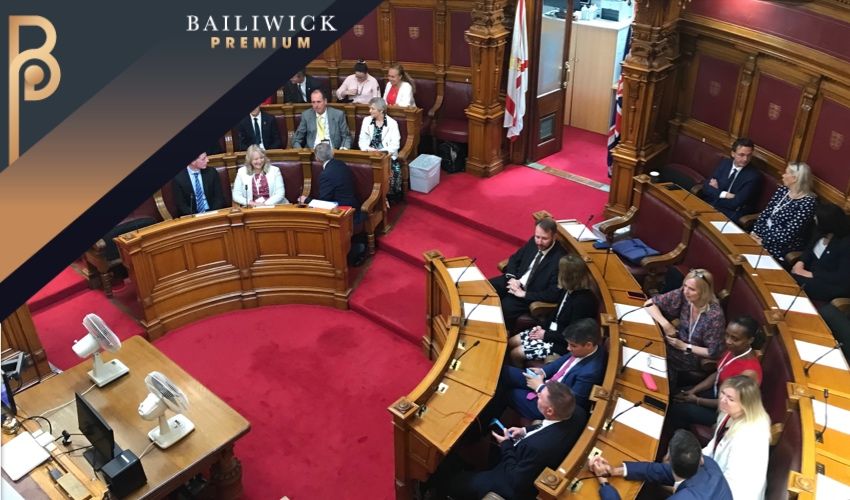


Jersey’s Ministerial system was introduced in December 2005. Overnight, the committee system, with its presidents and policy-forming ‘P&R committee’ came to an end and the States elected its first Chief Minister.
The new system appointed some of the elements of the key Clothier Review but not all.
In 2007, the Privileges and Procedures Committee published a review of Ministerial government, which had been set in motion by a successful proposition by Senator Ben Shenton, which the States has approved in November 2006.
In arguing for the review, Mr Shenton said: “I believe that if the States of Jersey Law 2005 [which brought in ministerial government] was a dog, it would probably be a ‘labradoodle’ – a mixed up cross-breed that, hopefully, may someday achieve pedigree status”.
16 years later, with the States recently electing its fifth Chief Minister and Council of Ministers, has that labradoodle finally made it to Cruffs, or does it remain a quirky mongrel that occasionally gets leaves a mess?
Among the 55 recommendations of the sub panel that the Privileges and Procedures Committee of the day set up were:
the States should work to reach a shared understanding of what Scrutiny is there to do and when, and what Scrutiny is not. This would include the Chairman’s Committee (now the Scrutiny Liaison Committee) publishing how the Strategic Plan, Business Plan and Budget (now the Common Strategic Policies and Government Plan) should be shared and scrutinised;
Assistant Ministers should only be appointed if the minister concerned has a meaningful role for them to undertake. Also, more use should be made of Assistant Ministers appointed to more than one department;
Assistant Ministers should have more responsibility and should be able to make orders under legislation that clearly falls within their remit;
delegated functions of Assistant Ministers should be made clear on each department’s website;
the creation of a private secretary role for the Chief Minister and more policy support for the Council of Ministers;
the membership of a Scrutiny Panel or sub-panel should not be heavily weighted in favour of a political party;
members of Scrutiny Panels should take care to ensure that information received by the panel is not used for individual political purposes, that is, information received in confidence by a Scrutiny Panel should not be used by an individual member in a personal capacity, for example, during question time in a States meeting;
there should be a formal process, conducted from time to time, to canvass the public’s views on matters for review. Alternatively, panels might consider holding public hearings from time to time, during which members of the public may have a limited time slot to question a departmental officer or minister on a matter of public or personal interest.
Earlier this year, another sub-panel, led by former Senator Tracey Vallois, published another review, this time on the ‘democratic accountability and governance’ of ministerial government.

Pictured: Tracey Vallois brought together Ministers past and present for her review.
This was against the backdrop of ‘P1/2018’ – a controversial piece of legislation approved during the tenure of Charlie Parker as CEO. This made the civil service head ‘Principal Accounting Officer’ for all public spending. In essence, it consolidated power in the hands of the CEO and away from departmental heads, and, in practice, the individual ministers above them.
Its 36 recommendations included:
the creation of a ‘Cabinet Office’ – an imported Westminster title considering Jersey doesn’t have a ‘cabinet’ – which would combine the Ministerial Support Unit and Strategic Policy, Planning and Performance (‘S Triple P’). This would strengthen the bond between ministers and policy making, the sub-panel concluded;
each department should have one Minister who is ultimately accountable for the whole of the department. Where the scope of a department is such that it is felt additional ministers are required, there should be a lead Minister and non-CoM Ministers with responsibility for specific areas of the department;
the Council of Ministers should report to the Assembly and keep updated a ‘policy pipeline’ showing the policies currently being worked on and proposed timescales for States decisions and implementation. The ‘pipeline’ should state which Minister is accountable for each policy;
voters should be provided with the opportunity to indicate their preferred candidate for Chief Minister during the voting process;
the States of Jersey Law 2005 should be amended to expand the role of Deputy Chief Minister and clarify that he or she is the authorised substitute for an executive decision whenever the Chief Minister is out of the Island or is otherwise indisposed;
the Scrutiny Liaison Committee should have greater autonomy and flexibility to change the name and remit of a Panel under Standing Orders;
consideration should be given to the role of the Chief Executive and whether there are too many powers invested in only one individual. If a Cabinet Office is established, the Head of the Cabinet Office could be responsible for providing advice to the Council of Ministers, and the Chief Executive to account to them for delivery policy initiatives.
The Vallois Review came too late for some of its recommendations to impact the June election: for example, voters were not able to express a view on who they wanted as Chief Minister, although the advent of political parties did make that clear.
Apart from Reform, however, parties did not find favour with the electorate, and it remains to be seen if they will return in another guise in four years’ time.

Pictured: Apart from Reform, parties did not find favour with the electorate.
Chief Minister Kristina Moore has, however, said she will introduce a ‘Council Office’ or whatever a Jersey version of the UK Cabinet Office will be called.
Despite the success of independent candidates vis-à-vis new parties, Deputy Moore got all her ministerial appointees through with very little challenge, and late last week she appointed her Assistant Ministers, which don’t need to go before the States Assembly for approval.
The Vallois Review found that there was “a lack of transparency over the role of Deputy Chief Minister, undermining accountability for the areas for which the DCM is given responsibility”.
Deputy Moore appears to have addressed that, at least so far, by not appointing a Deputy Chief Minister. Who will step up as political leader when the Chief Minister is on holiday and/or unavailable is yet to be determined, as least publicly.
The Chief Minister has said, however, that she may make more appointments, so a DCM could still be on the cards.
The Vallois Review also concluded that the role of Assistant Minister is unclear, which “undermines accountability and may deter some States Members from expressing interest in the roles available”.

Pictured: Kristina Moore is yet to name a Deputy Chief Minister, at least publicly.
Following a recommendation of the sub-panel, Deputy Moore has chosen several Assistant Ministers who have been given more than one portfolio. She said this was “to ensure that the Government is co-ordinated and better equipped to deliver the cross-cutting change that Islanders voted for”.
Despite the two reviews, more than a decade apart, it appears that Ministerial government is still a labradoodle still finding its way in the world.
It remains a Ministerial system with ministers, but without ministries, and one which was based with party politics in mind, which has just been rejected by the electorate, save the left-leaning alternative to the island’s naturally conservative heart.
Chief Minister Moore – promising to “get Jersey back on track” – may choose to embrace more of the Vallois recommendations, or new suggestions may be made in light of the June election results. Time will tell.
Express spoke to Senator Tracey Vallois in-depth about her review for its Politics Disassembled podcast earlier this year...
Subscribe to Bailiwick Podcasts on Spotify, Apple Podcasts, Deezer or Whooshkaa.
New Chief Minister plans to unpick OneGov
FOCUS: What does a Cabinet Office do?
INSIGHT: Unlimited power with limited accountability - An in-depth look at the 'Machinery of Government', and how the Government walked into a £500,000 scandal with its eyes open...
FOCUS: Meet your new Council of Ministers...
Comments
Comments on this story express the views of the commentator only, not Bailiwick Publishing. We are unable to guarantee the accuracy of any of those comments.